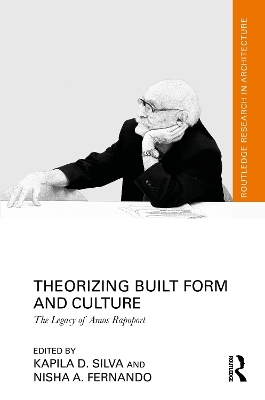
Theorizing Built Form and Culture
Routledge (Verlag)
978-1-032-43734-7 (ISBN)
In this collection of essays, Theorizing Built Form and Culture: The Legacy of Amos Rapoport – a felicitation volume to celebrate the significance of Professor Amos Rapoport's lifelong scholarship – scholars from around the world discuss the analytical relevance, expansion, and continuing application of these contributions in developing an advanced understanding of mutual relationships between people and built environments across cultures.
Professor Amos Rapoport has espoused an intellectual and theoretical legacy on environmental design scholarship that explains how cultural factors play a significant role in the ways people create and use environments as well as the way environments, in turn, influence people’s behavior. This volume presents a hitherto-not-seen, unique, and singular work that simultaneously articulates a cohesive framework of Rapoport’s architectural theories and demonstrates how that theoretical approach be used in architectural inquiry, education, and practice across environmental scales, types, and cultural contexts. It also acknowledges, for the very first time, how this theoretical legacy has pioneered the decolonizing of the Eurocentric approaches to architectural inquiry and has thus privileged an inclusive, cross-cultural perspective that laid the groundwork to understand and analyze non-Western design traditions. The book thus reflects a wide range of cross-cultural and cross-contextual range to which Professor Rapoport’s theories apply, a general notion of theoretical validity he always advocated for in his own writings.
The volume is a paramount source for scholars and students of architecture who are interested in understanding how culture mediates the creation, use, and preservation of the built environment.
Kapila D. Silva is Professor of Architecture and Associate Dean in the School of Architecture and Design at the University of Kansas, USA. He has previously taught at the University of Wisconsin–Milwaukee, USA, from where he received his doctorate, and at the University of Moratuwa in Sri Lanka, from where he received professional architectural education. He is the lead editor of four volumes on cultural heritage management in the Asia-Pacific region (all published by Routledge) and co-author of The Ṭämpiṭavihāras of Sri Lanka: Elevated Image-houses in Buddhist Architecture (Anthem Press, 2021). Nisha A. Fernando is Director and Associate Professor of Interior Architecture at the University of Kansas, USA. Prior to joining KU, she was Professor of Interior Architecture at University of Wisconsin at Stevens Point, USA, where she taught since 2001. She received her PhD in environment-behavior studies from the School of Architecture and Urban Planning at University of Wisconsin–Milwaukee and a master of science and bachelor of science in architecture from University of Moratuwa, Sri Lanka. Her broad scope of research includes culture–space relationships, and her most current research includes sensory aspects of spatial experiences and design pedagogy.
List of figures
List of tables
List of contributors
Acknowledgements
Foreword: about Amos
HENRY SANOFF
Introduction: the intellectual legacy of Amos Rapoport
KAPILA D. SILVA AND NISHA A. FERNANDO
PART I
Home and work environments
1 Analyzing the transformation of the Kuwaiti house
MOHAMMAD ALJASSAR
2 Amos Rapoport and my journey toward Culturally Enriched Communities
TASOULLA HADJIYANNI
3 Toward an understanding of environmental evaluations in urban residential areas: continuing the journey enlightened by Amos Rapoport
ÇAĞRI IMAMOĞLU
4 Integrating Amos Rapoport’s ‘systems of settings and activities’ and Anthony Giddens’
‘structuration theory’: the socio-spatial context of live-work environments
ATIYA MAHMOOD
5 Expanding on Amos Rapoport’s systems of activities and systems of settings in nursing workspaces
KAREN KEDDY
PART II
Cultural landscapes
6 Sensory experiences as cultural place identity: two case studies
NISHA A. FERNANDO
7 Amos in Arabia: humanizing principles in the architecture and urbanization of Abu Dhabi and Riyadh
YASSER ELSHESHTAWY
8 Culture, race, and marginalization: the case of African American storefront churches in central city Milwaukee
ASHA KUTTY AND NEWTON D’SOUZA
9 System of settings and activities: a framework to study vernacular settlements and cultural landscapes in China
WEI ZHAO
10 The Santhal house and cultural landscape in Shantiniketan, India
AMITA SINHA, KAILASHPATI MAURYA, AND UPAMA SEN
11 Theoretical inspirations of Amos Rapoport: reflections on the International Studies on Vernacular Settlements (ISVS)
RANJITH DAYARATNE
12 Exploring heritage from an environment-behavior studies perspective
KAPILA D. SILVA
PART III
Environmental well-being
13 Ambiance á la Rapoport: indoor environmental quality and its profiles
IHAB M. K. ELZEYADI
14 Residential choice and fit in a Milwaukee refugee enclave
LYNNE M. DEARBORN AND ANGELINA TSOUKALA
15 People-nature interactions within activity settings: understanding health-promoting mechanisms using Amos Rapoport’s three EBS questions
SUSANA ALVES AND GOWRI BETRABET GULWADI
16 Aging in place: the roles of food-related activities engagement among older Indonesian women
WIDYA A. RAMADHANI AND LYNNE M. DEARBORN
PART IV
Design theory, pedagogy, and practice
17 Amos Rapoport on design knowledge: enabling a theory for a trans-critical pedagogy in architectural education
ASHRAF M. SALAMA
18 Pedagogical implications of Amos Rapoport’s theoretical views
HISHAM S. GABR
19 Connecting design to education outcomes
SEAN O’DONNELL
20 How does culture influence design?
SANJOY MAZUMDAR
21 How does design affect culture?
SANJOY MAZUMDAR
Index
| Erscheinungsdatum | 12.03.2024 |
|---|---|
| Reihe/Serie | Routledge Research in Architecture |
| Zusatzinfo | 6 Tables, black and white; 40 Line drawings, black and white; 21 Halftones, black and white; 61 Illustrations, black and white |
| Verlagsort | London |
| Sprache | englisch |
| Maße | 156 x 234 mm |
| Gewicht | 770 g |
| Themenwelt | Kunst / Musik / Theater ► Design / Innenarchitektur / Mode |
| Geisteswissenschaften ► Psychologie ► Allgemeine Psychologie | |
| Technik ► Architektur | |
| ISBN-10 | 1-032-43734-0 / 1032437340 |
| ISBN-13 | 978-1-032-43734-7 / 9781032437347 |
| Zustand | Neuware |
| Informationen gemäß Produktsicherheitsverordnung (GPSR) | |
| Haben Sie eine Frage zum Produkt? |
aus dem Bereich


